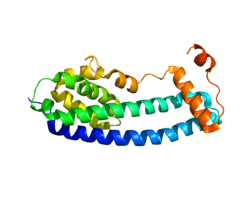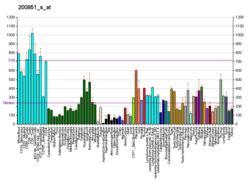KIAA0174
IST1 homolog is a protein that in humans is encoded by the KIAA0174 gene.[5][6]
References
- GRCh38: Ensembl release 89: ENSG00000182149 - Ensembl, May 2017
- GRCm38: Ensembl release 89: ENSMUSG00000031729 - Ensembl, May 2017
- "Human PubMed Reference:". National Center for Biotechnology Information, U.S. National Library of Medicine.
- "Mouse PubMed Reference:". National Center for Biotechnology Information, U.S. National Library of Medicine.
- Nagase T, Seki N, Ishikawa K, Tanaka A, Nomura N (Nov 1996). "Prediction of the coding sequences of unidentified human genes. V. The coding sequences of 40 new genes (KIAA0161-KIAA0200) deduced by analysis of cDNA clones from human cell line KG-1". DNA Res. 3 (1): 17–24. doi:10.1093/dnares/3.1.17. PMID 8724849.
- "Entrez Gene: KIAA0174 KIAA0174".
Further reading
- Hoja MR, Wahlestedt C, Höög C (2000). "A visual intracellular classification strategy for uncharacterized human proteins". Exp. Cell Res. 259 (1): 239–246. doi:10.1006/excr.2000.4948. PMID 10942595.
- Strausberg RL, Feingold EA, Grouse LH, et al. (2003). "Generation and initial analysis of more than 15,000 full-length human and mouse cDNA sequences". Proc. Natl. Acad. Sci. U.S.A. 99 (26): 16899–16903. doi:10.1073/pnas.242603899. PMC 139241. PMID 12477932.
- Matsuda A, Suzuki Y, Honda G, et al. (2003). "Large-scale identification and characterization of human genes that activate NF-kappaB and MAPK signaling pathways". Oncogene. 22 (21): 3307–3318. doi:10.1038/sj.onc.1206406. PMID 12761501.
- Ota T, Suzuki Y, Nishikawa T, et al. (2004). "Complete sequencing and characterization of 21,243 full-length human cDNAs". Nat. Genet. 36 (1): 40–45. doi:10.1038/ng1285. PMID 14702039.
- Gerhard DS, Wagner L, Feingold EA, et al. (2004). "The status, quality, and expansion of the NIH full-length cDNA project: the Mammalian Gene Collection (MGC)". Genome Res. 14 (10B): 2121–2127. doi:10.1101/gr.2596504. PMC 528928. PMID 15489334.
- Rush J, Moritz A, Lee KA, et al. (2005). "Immunoaffinity profiling of tyrosine phosphorylation in cancer cells". Nat. Biotechnol. 23 (1): 94–101. doi:10.1038/nbt1046. PMID 15592455.
- Rual JF, Venkatesan K, Hao T, et al. (2005). "Towards a proteome-scale map of the human protein-protein interaction network". Nature. 437 (7062): 1173–1178. doi:10.1038/nature04209. PMID 16189514.
- Lim J, Hao T, Shaw C, et al. (2006). "A protein-protein interaction network for human inherited ataxias and disorders of Purkinje cell degeneration". Cell. 125 (4): 801–814. doi:10.1016/j.cell.2006.03.032. PMID 16713569.
External links
- PDBe-KB provides an overview of all the structure information available in the PDB for Human IST1 homolog
This article is issued from Wikipedia. The text is licensed under Creative Commons - Attribution - Sharealike. Additional terms may apply for the media files.





